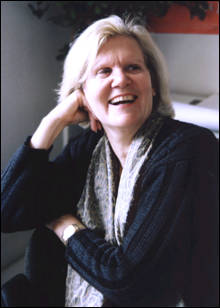 James Levine’s opening salvo for his year-long Beethoven/Schoenberg series with the Boston Symphony Orchestra couldn’t have been more ambitious: Beethoven’s overwhelming Missa solemnis, the work that opened Symphony Hall in 1900. It looked very promising on paper, especially the vocal quartet of Metropolitan Opera stars: soprano Deborah Voigt, mezzo-soprano Lorraine Hunt Lieberson, tenor Ben Heppner, and bass René Pape. But last month the BSO announced that Lieberson was being replaced by Jill Grove. Then the day of the first performance, Voigt withdrew, and soprano Christine Brewer was flown in by private jet to sing without a rehearsal. (She arrived 20 minutes before curtain.) Last March, Voigt cancelled the first two of three performances of Levine’s first BSO Wagner opera, Der fliegende Holländer. Her replacement was heroic but inadequate. Brewer, however, was more than adequate — in fact, she just about stole the show with her blazing high notes and fervent phrasing.
James Levine’s opening salvo for his year-long Beethoven/Schoenberg series with the Boston Symphony Orchestra couldn’t have been more ambitious: Beethoven’s overwhelming Missa solemnis, the work that opened Symphony Hall in 1900. It looked very promising on paper, especially the vocal quartet of Metropolitan Opera stars: soprano Deborah Voigt, mezzo-soprano Lorraine Hunt Lieberson, tenor Ben Heppner, and bass René Pape. But last month the BSO announced that Lieberson was being replaced by Jill Grove. Then the day of the first performance, Voigt withdrew, and soprano Christine Brewer was flown in by private jet to sing without a rehearsal. (She arrived 20 minutes before curtain.) Last March, Voigt cancelled the first two of three performances of Levine’s first BSO Wagner opera, Der fliegende Holländer. Her replacement was heroic but inadequate. Brewer, however, was more than adequate — in fact, she just about stole the show with her blazing high notes and fervent phrasing.
“The Missa solemnis is the greatest piece ever written,” Levine announced in his program note. “Really, I mean it” — though he goes on to say that there are also “many other ‘greatest pieces ever written.’ ” And maybe he treated it too much like a masterpiece, a monument, veering between Toscanini’s operatic urgency and Klemperer’s sublime spacious grandeur but lacking his own point of view, or a consistent underlying motive (or pulse). I missed any sense of rediscovery. Two months after September 11, David Hoose led the Cantata Singers in a live performance that was fleet and unstoppable — except when time itself suddenly seemed suspended.
Levine began slowly, touchingly, as if feeling his way into the score. Each of the series of rising, broadly arching phrases seemed injected with an extra push. He underlined Beethoven’s contrasts between fast and slow, loud and soft. Symphony Hall shook on the great climaxes. The last of the soloists to enter was Pape, whose opening “Christe eleison” embodied the voice crying in the wilderness as opposed to the weighty and rather undifferentiated pronouncements of the full chorus.
The Tanglewood Festival Chorus was powerful and stirring but not pitch perfect. Diction is always a problem in this work, given its extended high-speed fortissimo passages, but opening night the TFC sounded unusually blurry. Grove’s strong round voice lacked Lieberson’s uncanny emotional identification. Heppner was impassioned, heroic, but occasionally forced and reedy. Pape, on the other hand, got deeper and darker, ending with a full-hearted, broken-hearted Miserere.
The orchestra was impressive: Timothy Genis (timpani) and Richard Svoboda (bassoon) were especially convincing. Malcolm Lowe’s big violin solo in the Benedictus was one of the few passages to treasure in Seiji Ozawa’s empty version five years ago. That solo is the Missa’s clearest foreshadowing of Beethoven’s late string quartets (the Missa is Opus 123; the first of the late quartets is Opus 127) and one of the most searching, inward moments in the Mass; it mustn’t sound hammy or like mere display. But this time it did both. There were things of beauty, especially the heavenly lullaby in the Agnus Dei between the Miserere and the Dona nobis pacem. But too much of this performance sounded generic, more dutiful than exploratory. Maybe everyone was unsettled by the last-minute cast change. Everyone except Brewer herself, who along with Pape gave the most consistent demonstration of how this piece should go.